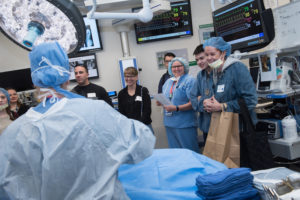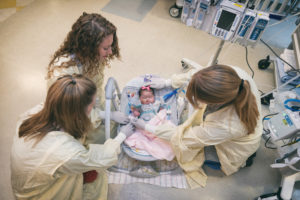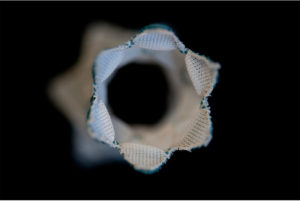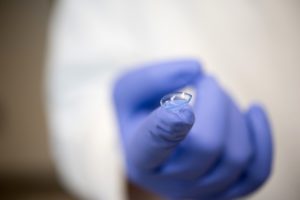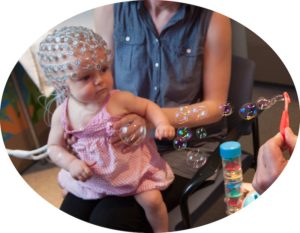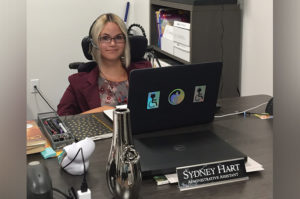Pediatric stroke: Do you believe these three myths?
Think fast: How much do you know about pediatric stroke? If you’re like many clinicians, you may not even realize that kids can have strokes. Yet knowing the signs of stroke in children, as well as when to refer, is crucial for primary care providers as well as specialists. Here, Miya Bernson-Leung, MD, EdM, a ... Read More about Pediatric stroke: Do you believe these three myths?
Scoliosis patients get a preview of spinal fusion surgery
“Patients are more at ease when they know what to expect,” says, Dr. Daniel Hedequist, chief of the Spine Division in the Department of Orthopedic Surgery. Dr. Hedequist performs dozens of spinal fusion surgeries each year to treat children with scoliosis. While the procedure is familiar ground for the surgical team at Boston Children’s Hospital, ... Read More about Scoliosis patients get a preview of spinal fusion surgery
Improving developmental care for infants in the Cardiac Intensive Care Unit
Infants born with congenital heart disease (CHD) are some of the most fragile patients, often requiring surgery or other interventions in the first few months after birth. They also face a higher risk of developmental delays, learning disabilities, and behavioral problems than children born with a healthy heart. To help mitigate these developmental challenges, a ... Read More about Improving developmental care for infants in the Cardiac Intensive Care Unit
Innovations in transcatheter valve replacement
The Cardiac Catheterization Program at Boston Children’s Hospital has been at the cutting edge of pediatric care for more than 60 years, developing and refining innovative catheterization techniques and procedures. “The program was built on a culture of collaboration, training, and innovation,” says Diego Porras, MD, FAAP, program chief. “We continue to foster new ideas ... Read More about Innovations in transcatheter valve replacement
An advance for drug-eluting contact lenses: Delivery to the back of the eye
Drug-eluting contact lenses, which gradually release drugs into the eye, offer a promising alternative to daily eye drops, which can be unpleasant and hard for patients to properly administer. In a 2016 pre-clinical study of glaucoma, the engineered lenses lowered eye pressure at least as well as daily eye drops. New work from Massachusetts Eye ... Read More about An advance for drug-eluting contact lenses: Delivery to the back of the eye
Gavin: My Crohn’s disease story
When I was 10 years old, I was diagnosed with Crohn’s disease. For a few months at the end of fourth grade, I didn’t feel well on and off. I was having stomach pains and diarrhea a couple times a week. In June I went to see my doctor and she thought I was developing ... Read More about Gavin: My Crohn’s disease story
Babies’ EEG patterns predict whether they will develop autism
Signs of autism spectrum disorder (ASD) typically start to become apparent only in a child’s second year of life or later, but earlier identification could allow children to receive interventions as babies, when they have greater brain plasticity and thus may receive more benefit. A new study in Nature Communications finds that periodic EEGs in ... Read More about Babies’ EEG patterns predict whether they will develop autism
Minimally invasive approaches help ease Sydney’s chronic pain
Sydney Hart wants to reimagine the traditional “handicap” symbol. In her online shop, she offers pins, stickers, and other products that infuse the classic wheelchair silhouette with yin-yang symbols, LGBTQ and transgender flags, and even sassy devil horns. “I hope that having symbols with more character will open up the conversation and humanize people with ... Read More about Minimally invasive approaches help ease Sydney’s chronic pain
From local teams to elite athletics: Caring for youth athletes with disabilities
Anna Johannes considers herself lucky. “My swim coaches were oblivious to my disability — in a good way,” says the U.S. Paralympic medalist. Anna, who joined Boston Children’s Hospital as a cause marketing coordinator in 2018, was born with amniotic band syndrome, a condition that led to the loss of her left hand and forearm. ... Read More about From local teams to elite athletics: Caring for youth athletes with disabilities
Meet BORIS: A new culprit in drug-resistant cancer?
Like a Russian bot corrupting U.S. elections, or a new prime minister wreaking havoc in the U.K., a protein named BORIS is showing itself to be a malevolent player in some childhood cancers. New research fingers BORIS as a culprit that can hack the neuroblastoma genome, rousing the cancer cells from dormancy after certain types ... Read More about Meet BORIS: A new culprit in drug-resistant cancer?



